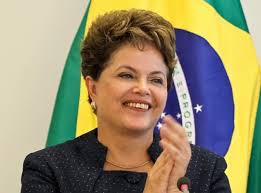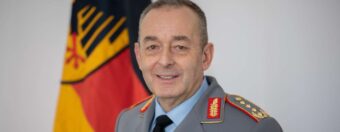
The Swedish company Saab and Brazil have this week signed a contract for delivery of 36 fighters of the type JAS Gripen. The contract has a value of 40 billion Swedish kronor. The deliveries of Gripen Next Generation will start in 2019 and last until 2024. This was the first huge decision for the Brazilian Government after the election of the new Brazilian President, writes Nordic News.
First female Presiedent
Dilma Rousseff, the first woman to be elected president of Brazil, has had her share of career ups and downs.She first came to prominence as the protege of Luiz Inacio Lula da Silva, Brazil’s beloved former president who is better know as Lula. But she has been unable to match his popularity – and her critics say she would not have been elected president from the Social Democratic Party again without his support. What about the economic future of BRICS: Brazil, Russia, India, China and South-Africa, was discussed at IMD.
Conference on Brazil
In October The Siss Management Schhool IMD hosedt a one-day conference with leading experts on the future of Brazil. The event, titled «Brazil: What Next?», focused on the presidential election, doing business in the country, the impact of global sports events and more. The Norwegian Banks Investment Management have invested 38 billion Norwegian Kroner through 144 prosjects in Brazil. The investment in the Brazilian oil company Petrobraz amounted 3,6 billion kroner, is one of the largest financial Norwegian Investments in Brazil.
Special Interview
In this interview, one of the event’s organizers, IMD Professor Carlos A. Primo Braga, takes a critical look at Brazil’s current development model for Nordic News. Carlos A. Primo Braga is Professor of International Political Economy at IMD, and Director of The Evian Group@IMD. He teaches in the Orchestrating Winning Performance program. Why has there been so much disappointment with Brazil’s economic performance? Carlos Braga: Brazil’s economic performance has been disappointing since 2011, and the country remains one of the worst performers among emerging economies. Since 2011, the economy has been growing well below its potential (which is typically estimated to be around 3.5 to 4% per year). GDP growth is expected to remain anaemic in the 0.3 to 0.9% range in 2014. As I wrote recently, the current consumption-led development model, driven by income redistribution and credit expansion, has run its course. The potential of the Brazilian economy, however, remains very high. Brazil is one of the top five destinations for foreign direct investment in the world – attracting $64 billion of foreign direct investment inflows in 2013. Moreover, if Brazil is able to foster a private sector-ledinvestment recovery, it will break the vicious cycle of below-potential growth rates feeding into negative expectations and vice versa. That is why the upcoming presidential election is so important. There has been a lot of criticism about Brazil hosting the World Cup and the Olympics while the country has so many social problems.
-Should Brazil not have bid to host the games? Were there any benefits?
Carlos Braga: This has led to mixed reactions in Brazil. Initially, granting the World Cup to Brazil and the 2016 Olympic Games to Rio de Janeiro led to positive reactions and was interpreted as further evidence of Brazil’s growing influence on the world stage. As the economy slowed down, many Brazilians began to debate the value of such projects in a country with many social challenges. This debate led to mass demonstrations in 2013 against the hosting of the World Cup.
Negative to the Championship
Ironically, despite the «poor» – by Brazilian standards – performance of the national team at the World Cup, in the end there was broad consensus that the event was one of the best World Cups ever held. Of course, the quality of the matches was the main factor behind such a perception. But the fact that the tournament proceeded smoothly, despite many logistical concerns and fears about street protests, suggests that the Brazil «brand» was strengthened by hosting the World Cup. In the end, such events are like big parties. It is difficult to derive net economic benefits from them, but if successful they may have positive welfare implications in the near term. Needless to say, wasted resources in building «white elephants» (e.g., large stadiums in remote cities) qualify such considerations.
Positive for Rio de Janeiro
In the case of the Olympic Games, there is an opportunity to explore investments in infrastructure (e.g. transportation) that may have a positive legacy for Rio de Janeiro. The more these investments are well synchronized with a broader urbanization strategy (as was the case, for example, in Barcelona) the better the chances of a net positive economic outcome. It is, however, a major political and managerial challenge. That is why we are dedicating a whole session of the upcoming conference to analyzing the economic implications of mega-sport events.
What’s next for Brazil?
Carlos Braga: The presidential election is too close to call. The first round took place on October 5th and we will now have a chance to discuss initial results after the election and the conference. The growth constraints faced by Brazil are dominated by supply-side problems that require significant structural reforms and they will take time to be addressed. But one can quickly reset expectations if the right signals are given. This could be an opportunity to unleash a new cycle of growth. In short, independently of who wins the election, it is time to revisit the development model and to better explore the many strengths of the Brazilian economy. IMD focused on the opportunities and challenges of doing business in the country. It will feature panel discussions on prospects for Brazil’s economy; investing in Brazil; the international expansion of its leading companies; the impact of major sports events; and how the country compares to the other BRICS markets.
Still much Corruption
It is also interesting to note that the majority of the people interviewed (61 per cent) thought that hosting the FIFA World Cup was not a good thing because it diverted funds from more urgent public priorities. To get such results in the «country of football» (the only one to have won the World Cup five times) is, to say the least, a surprise. The negative mood comes together with a list of usual concerns for the population: inflation, crime, poor health care, and corruption, says Carlos Primo Braga.




